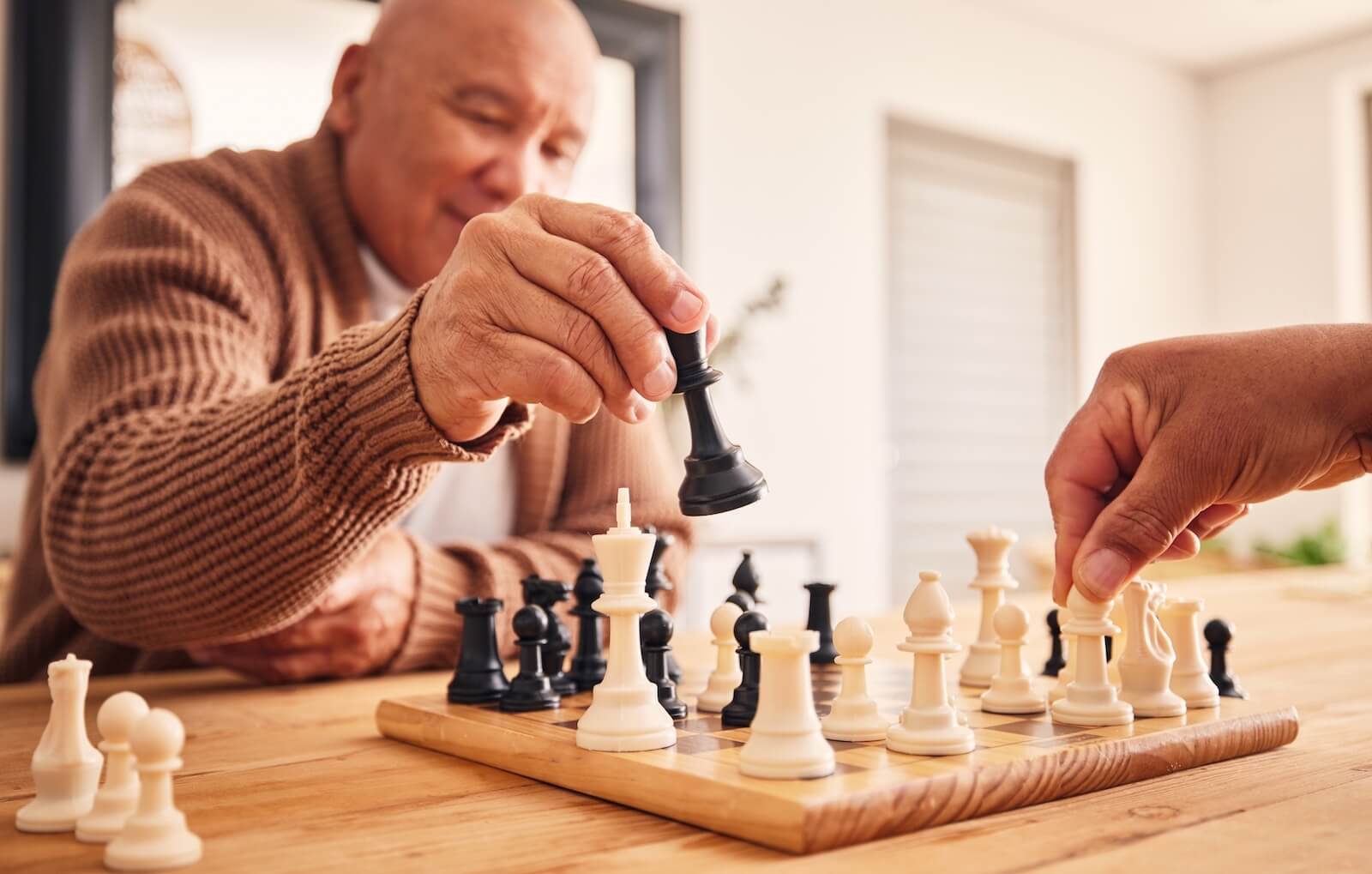Brain health plays an important role in a fulfilling, independent life. It supports memory, sharp thinking, mental health, and more. For seniors, this makes all the difference in the world—a strong brain is directly linked to a higher quality of life. So what activities promote brain health for seniors?
Some of the top activities for improving brain health include:
- Regular exercise
- Socializing with others
- Brain-training exercises
- earning new skills
- Following a healthy diet
- Getting quality sleep
Your loved one deserves a community that supports them in all their activities. So why are these all so important?
Regular Exercise
Physical exercise is one of the most effective ways to support brain health. According to the CDC, seniors should try to perform:
- 150 minutes of low-to-moderate-intensity exercise every week
- Or, 75 minutes of higher-intensity exercise every week
- 2 sessions of muscle-strengthening exercises every week
- Regular balance exercises to maintain strong joints and balancing abilities
When seniors move their bodies, it helps train the mind.A healthy body is key to improved mental sharpness, clarity, and mood. With just a few sessions a week, your loved one can steadily improve their brain health.
Socializing With Others
Humans are social creatures. Staying connected doesn’t just help people bond with one another—it’s closely linked with improved cognitive abilities.
Regular interaction reduces feelings of isolation and lessens stress levels in the brain. With regular conversations, your loved one can keep their mind active and maintain their brain health.
If they don’t know where to begin, encourage them to try:
- Sharing meals with others
- Participating in book or discussion clubs
- Joining arts and craft workshops
- Playing low-stakes games like cards or dominoes
- Attending community events or outings
Even small social engagements add value to everyday life. These moments build emotional connections and create positive impacts on brain health. This approach is simple, but the benefits are incredible.
Brain-Training Exercises
Brain-training exercises give the mind enjoyable challenges to tackle. They engage memory, logic, and creativity—and these all promote a strong brain. These all go a long way towards improved mental abilities.
Some simple brain-training activities for seniors include:
- Crossword puzzles
- Sudoku or word searches
- Playing chess or checkers
- Memory games online or in print
- Engaging in apps designed for cognitive training
These exercises all create new neural connections, which help the brain grow and adapt. They challenge and entertain at the same time, so they’re a great choice for improving brain health!
Learning New Skills
Learning new skills is a great way to encourage brain activity at any age. It creates fresh challenges that stimulate thinking and problem-solving. This habit also offers a sense of achievement, which is wonderfully motivating.
If your loved one is considering taking up a new hobby, try encouraging:
- Knitting, crocheting, or sewing
- Cooking or trying new recipes
- Gardening for relaxation and creativity
- Learning basic computer or smartphone skills
- Experimenting with painting, drawing, or other arts
These are easy to work into everyday life. They bring variety and fun challenges to every day. Meanwhile, they even boost mental health—all while strengthening your loved one’s brain.
Following a Healthy Diet
Nutrition is an essential part of a healthy brain. The human brain is extremely complicated, and it requires a specific mix of vitamins and nutrients to stay healthy. For example, omega-3s support brain function, while antioxidants reduce potential damage to cells.

Fortunately, it’s simple to incorporate more brain-friendly foods into a diet. Try encouraging your loved one to eat more foods like:
- Fatty fish such as salmon or mackerel
- Leafy greens like spinach and kale
- Berries, including blueberries and strawberries
- Nuts and seeds, like walnuts and flaxseeds
- Whole grains such as oats and quinoa
Staying hydrated is just as important, as even mild dehydration can make it harder to concentrate or stay focused. By including these in their regular diet, your loved one will be giving their brain the nutrients needed to thrive.
Getting Quality Sleep
Sleep plays a critical role in building and maintaining memory. It’s the brain’s time to rest and recover from the day. But poor sleep and inconsistent rest throw off mental clarity, which leaves the mind weaker and less rested.
Simple bedtime habits can help create a calming nighttime routine. It helps to:
- Keep a consistent sleep schedule, going to bed and waking up at the same time daily.
- Create a supportive environment by lowering lights, removing screen distractions, and keeping the bedroom cool.
- Avoid caffeine or heavy meals before sleeping.
- Wind down with relaxation techniques like reading or listening to soft music.
- Try light stretching or breathing exercises before bed.
A calm, relaxing routine signals to the brain it can slow down and prepare for rest. This makes all the difference—it’s key to staying sharp, ready, and focused the next day.
Find a Supportive Community
Life in a caring community makes it easier to stay mentally engaged. It’s an easy way to make sure your loved one is always supported—just like they deserve. And here at All American Assisted Living at Raynham, we’re ready to help.
We offer plenty of activities designed to strengthen the mind, and our team is always here to support your loved one. Contact us today to schedule a tour to come see everything we have to offer!





